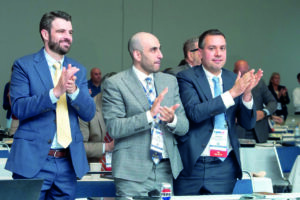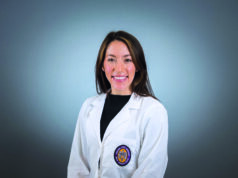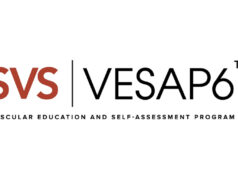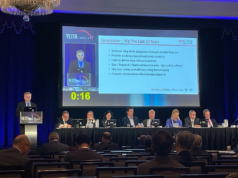
The Vascular Quality Initiative (VQI) Patient Safety Organization’s Fellowship in Training (FIT) Program has announced its third class of FIT participants for 2024–25 alongside the new FIT scholars.
VQI FIT began in January 2022 and is designed to introduce residents and fellows in vascular surgery and other cardiovascular-related training programs to the SVS’ Vascular Quality Initiative (VQI). It aims to foster an understanding of quality processes and metrics through mentorship in the VQI, in collaboration with the Association of Program Directors in Vascular Surgery (APDVS), American College of Cardiology (ACC) and Society for Vascular Medicine.
Participants and mentors use clinical performance data from the VQI registries to enable trainees to learn about quality improvement in healthcare. Each trainee works on projects involving either health services and outcomes research or quality improvement, all designed to improve patient health outcomes.
Adam Johnson, MD, chair of the VQI FIT Committee, looks beyond these current projects and into the future. “What really excites me are the people in the program that we’re investing in, giving them skills they need to have a successful next project,” he said. These skills will help “build who they are as innovators and changemakers and help them become the next generation of leaders in vascular surgery.”
The 2024–25 FIT participants, (mentors), centers, and projects are:
Quality Projects
- Lisa Vi (mentor Miranda Witheford), University Health Network, Toronto, Canada; studying the impact of homelessness on vascular surgery
- Chinmayee Pottie, (Matthew Corrierre), The Ohio State University, Columbus; how distance to a high-volume center, insurance and primary care provider affect patients with severe late-stage aortic and peripheral arterial disease
- Lindsey A. Olivere, (Michael Madigan), University of Pittsburgh Medical Center (UPMC); working on an institutional quality improvement project to establish a post-amputation care pathway in order to centralize and improve care delivery to amputees
- Gabrielle Rieth (Matthew Corriere), The Ohio State University; utilizing thromboelastography (TEG) to correct coagulopathy and improve patient outcomes in vascular surgery
- Vinay Bhushan Lakki, (Abhishek Singh), Creighton University Medical Center, Omaha, Nebraska; implementing standardized patient selection criteria for carotid artery stenting
- Ioannis Tsouknidas, (Robert Meisner), Lankenau Medical Center, Wynnewood, Pennsylvania; studying limb preservation, including indications, techniques and results
- Falen Demsas, (Nikolaos Zacharias), Massachusetts General Hospital, Boston; examining how to implement culturally competent surgical care practices to reduce disparities in surgical outcomes among underserved populations
- Brandon Gaston, (Nikolaos Zacharias), Massachusetts General Hospital; performing a retrospective head-to-head comparison of frailty calculators for predicting outcomes, length of stay and post-surgery readmission
Research Projects
- Guillermo Polanco Serra, (Pouya Entezami), Henry Ford Health, Detroit; evaluating the effectiveness of novel endovascular treatments to hemodialysis salvage
- Michael Chaney, ( Jason Ryan), Western Michigan University, Kalamazoo; evaluating the association between Global Limb Anatomic Staging System (GLASS) scoring, and amputation-free survival and wound healing after isolated proximal endovascular intervention
- Lara Lopes, (Ashley Vavra), Northwestern Memorial Hospital, Chicago; examining the correlation between residence in limited food-access or low-income areas and outcomes following revascularization for PAD
- Karan Chawla, (Matthew Blecha), Loyola Medical Center, Maywood, Illinois; examining variation in thoracoabdominal aortic aneurysm repair (TAAA) and carotid interventions across institutions
- Lorela Weise, (Matthew Blecha), Loyola University; examining the thoracic endovascular aortic repair (TEVAR)-complex aortic dataset to determine the efficacy of petticoat placement and its association with 30-day mortality
- Angela Danielle Sickels, (Adam Beck), University of Alabama Medical Center, Birmingham; evaluating the optimal threshold diameter in women’s elective AAAs
- Menna Hegazi (Nii-Kabu Kabutey), University of California, Irvine; evaluating the presence and clinical significance of various disparities in dialysis access
- Isaac Naazie (Linda Harris), Buffalo General Medical Center, New York; investigating the comparative effectiveness of treatment modalities, identifying predictors of adverse outcomes in vascular surgery
- Irina Kanzafarova, (Michael Stoner) University of Rochester, New York; studying outcomes of infrainguinal bypass surgery with simultaneous distal outflow endovascular intervention versus standard infrainguinal bypass surgery
- Justin Jay Bader, (Cassius Iyad Ochoa Chaar), Yale New Haven Hospital, Connecticut; using patient databases and known predictive risk factors to design and build a model to predict the risk of post-contrast acute kidney injury depending on volume of contrast given
- Camila Guetter, (Marc Schermerhorn), Beth Israel Deaconess Medical Center, Boston; investigating the relationship between diabetes mellitus and antidiabetic medications with changes in aneurysmal sac size post-endovascular aneurysm repair (EVAR) for AAA
- Guarang Joshi, (Marc Schermerhorn), Thomas Jefferson University, Philadelphia; identifying the ideal off-the-shelf graft for promoting the best outcomes in endovascular repair for ruptured AAA
In addition, past participants also received the Jack. L. Cronenwett Quality Improvement Scholarship Awards to continue research and/or work more closely with VQI/ PSO staff and committees. The scholarship is named for Dr. Jack L. Cronenwett, the VQI registry’s co-founder, vascular surgeon and educator. He is professor of surgery emeritus at Dartmouth-Hitchcock Medical Center, was professor of the Dartmouth Center for Health Care Policy and Clinical Practice for nearly 34 years and is chief medical officer for Fivos, VQI’s data management partner.
Scholars named
Five vascular trainees have been selected as FIT Scholars for 2024–25. The safety program is part of the VQI. They are:
- Christine Kariya (Danny Bertges), University of Connecticut, Farmington; implementing patient-reported outcomes (PRO) for better understanding of outcomes in endovascular treatment of PAD and venous care in women with varicose veins, particularly in underserved populations
- Mitri Khoury (Nikolaos Zacharias), University of Arizona, Tuscon; refining the PSO definition of “medically unfit” using registry information and major adverse outcomes to help determine treatment plans
- Christopher Chow (Arash Bornack), University of Miami, Florida; evaluating outcomes of carotid artery stenting in patients with uncommon conditions such as variant aortic arch anatomy or patients with primary carotid artery dissection
- Mikayla Lowenkamp (Michael Madigan), UPMC; smoking cessation and medical management in vascular diseases, including developing educational materials and integrating tobacco specialists into outpatient clinics
- Saranya Sundaram (Thomas Brothers), Medical University of South Carolina; tracking carotid endarterectomies and outcomes after new quality improvement measures were implemented, including data on the ease of use of the measure at the six- and 12-month marks
- Amanda Filiberto (Adam Beck), University of Alabama at Birmingham; studying data and outcomes to ascertain if the VQI’s definition of acute kidney injury after surgery should be changed to align with the updated national definition
Learn more about the FIT Program and its participants at vqi.org.












